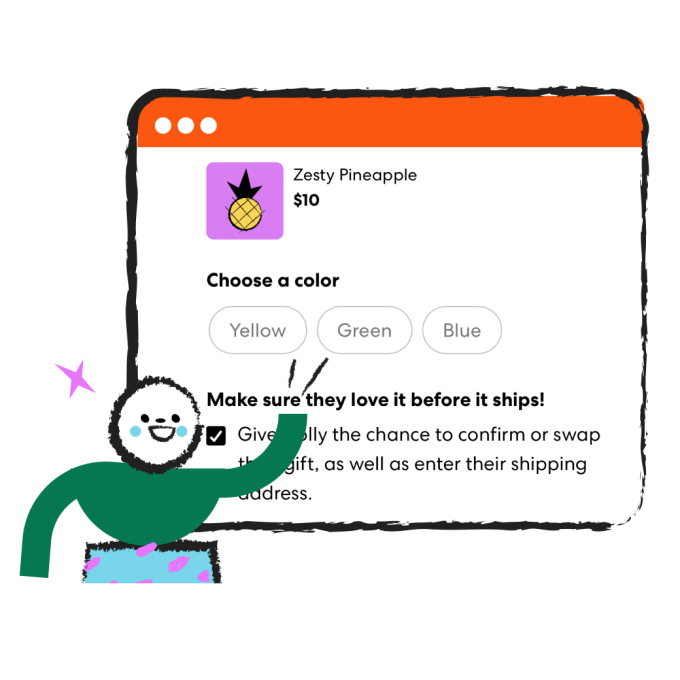While e-commerce was on the rise before the pandemic, the massive shift to digital supercharged the online shopping industry — bringing entirely new categories of products (and shoppers) to the web. According to Adobe, Americans have spent a record $1.7 trillion online over the last two years, a 55% uptick from two years before the pandemic.
A fair number of those online purchases are gifts as revealed by search trends — from 2019 to 2020, there was an 80% increase in searches for “online gifting” on Google Search. But despite the fact that hundreds of billions of people now regularly turn to digital channels (e.g. Amazon) to gift, the gifting experience remains subpar. That’s the opinion of Alex Ingram, at least, who co-founded a startup — Zest — that’s focused on e-commerce gifting flows.
Zest is Ingram’s second company after Sunlight Health, which sought to make brand-name and specialty prescription medications affordable for patients with chronic conditions. He met Zest’s second co-founder, Jeremy Feinstein, while working at Flatiron Health, where they helped to develop cancer center software.
“After Flatiron’s sale to Roche, we both felt it was time for something new,” Ingram told TechCrunch via email. “Obviously, e-commerce is worlds away from oncology. But we wanted to build something that could really help small- and medium-sized businesses to succeed in an increasingly challenging environment.”

With Zest, Ingram says that the goal was to make the experience of online gifting “delightful.” How? By allowing e-commerce brands to embed a “send as a gift” button on their product or cart pages and letting givers choose a digital greeting card, add their own message, pay through Shopify and deliver the gift to the recipient via text or email. With gifts gifted through Zest, recipients — who can opt into shipping notifications — can add their own mailing address or customize the gift’s attributes (like size or color) and optionally send a thank-you note to the sender.
There’s certainly something to affording recipients some choice in their online gifts. While it might ruin the surprise, a 2015 survey from Loop Commerce (now GiftNow) found that buying the wrong size and the hassle of online returns were some of the top reasons people were reluctant to buy gifts online.
Ingram is well aware that Zest isn’t the only online gifting tool out there. There’s Goody, which has raised millions in venture capital for its mobile app that lets users send gifts via text. Givingli, an online gifting service that lets users customize digital greetings and send gifts to anyone, recently closed a $10 million equity round. GiftNow is perhaps Zest’s closest competitor, offering a checkout technology that lets customers buy gifts without having to worry about product details like size, color and shipping addresses.
But Ingram argues that Zest uniquely takes a “brand-first” approach, helping brands grow by building direct relationships with their customers.
“With some of the other gifting tools out there, the brands are almost an afterthought,” Ingram said. “Zest makes sending a gift a convenient and easy experience for shoppers, who never have to leave their favorite brand’s website — it’s as intuitive as clicking ‘Add to Cart’ or ‘Buy It Now.’ There are lots of e-gift card apps too, but we don’t believe e-gift cards are the future of gifting. They feel transactional and impersonal. They’re so forgettable that billions of dollars of gift cards go unused every year in the U.S. And many brands don’t like to deal with the accounting headaches that come with the long-standing liabilities of unused gift cards.”

The future of e-gift cards aside — to Ingram’s point, consumers seem to prefer physical gift cards over digital — Zest is evidently beating back rivals to gain a toehold in the gifting space, with about 50 customers across categories like food and beverage, apparel and flowers. Ingram wouldn’t disclose revenue figures. But he revealed that Zest has raised $4 million in seed funding led by GV (formerly Google Ventures) with participation from BoxGroup, Character, Operator Partners, Bungalow Capital and Company Ventures.
“E-commerce and gifting exploded during the pandemic,” Ingram said. “People wanted to send more gifts to friends and family to help bridge the literal gap between them and loved ones. And while that growth rate has slowed, it’s a behavior that’s here to stay. [But] it’s never been harder for direct-to-consumer brands to acquire and retain customers. That’s partly due to the sheer number of direct-to-consumer brands out there today … For brands, the value we’re providing is first and foremost an elevated gifting experience for their customers. When it’s so easy and natural to send a gift directly from a product or cart page, these brands will sell more gifts and reach more people.”































Comment